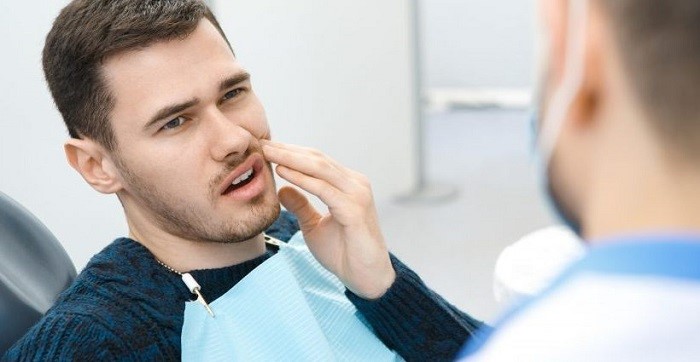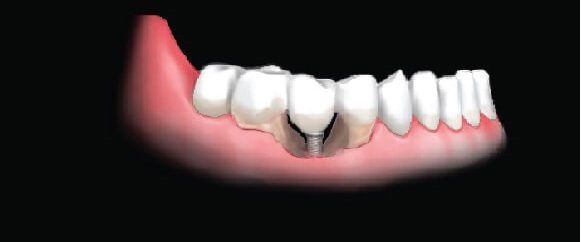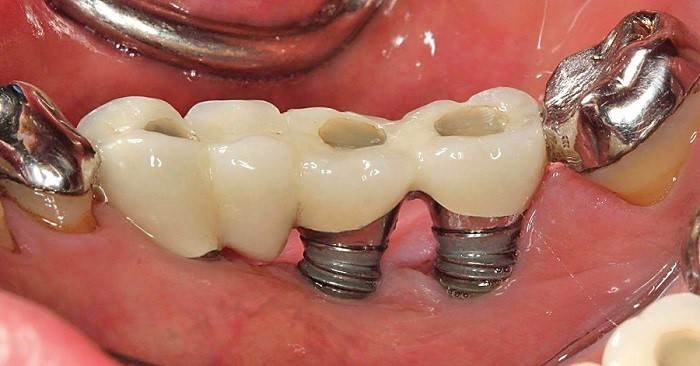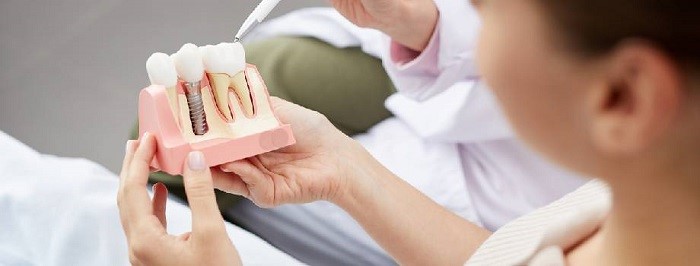Dental implants are effective way to replace your missing or severely decayed teeth. Implants, while artificial, should be maintained along with your natural teeth. Some people tend to be more susceptible to problems or complications with their dental implants. Peri-implantitis is an infection that hurts gums, bones and other tissues surrounding dental implants. It is very similar to gum disease. Severity can range from minor inflammation of the gums to severe degradation of the teeth and jaw. If left untreated, this often leads to patients losing their dental implants and developing other serious dental problems.
While there are risks associated with dental implants, they tend to be rare and minor. If you’re wondering if dental implants are a good option for you, discuss it with your dentist.
Causes of Dental Implant Infection (Peri-implantitis)
Although implant infections are usually caused by the presence of bacteria during or immediately after the oral surgery, an infection can also happen months or years after surgery. The most common implant complications related to infection can be caused by:
- Poor sterilization– if the dentist does not follow carefully the proper sterilization procedures, a contaminated tool may infect the surgical site with bacteria during the fixture insertion.
- Poor material quality– low quality implants may not fit precisely leaving a gap between the fixture and the bone that could attract bacteria and get infected.
- Improper placement– an improperly placed dental implant may also leave some space between the fixture and the bone that could allow bacteria to invade and infect it. Premature loading, leading to bone micro-fractures that may trap bacteria, is another potential cause of peri implantitis.
- Restoration problems– if the crown used for the tooth restoration is oversized or has an abnormal contour putting pressure to gingival tissues, it can lead to inflammation and infection.
- Poor oral hygiene– if the patient does not follow the dentist’s advice and oral hygiene instructions after the surgery, the accumulation of dental plaque can cause gum disease and infection. Bacteria can infect the jawbone either directly if they can enter between the implant and bone, or by first infecting the surrounding gum tissues. Poor oral hygiene is one of the main causes of late implant failure due to infection even years later.
4 Signs of an Infected Dental Implant
Receiving dental implants is one of the safest and most common forms of oral surgery performed today. This procedure is entirely safe with very few potential complications. In rare cases, patients may experience an infected dental implant. Recognizing the symptoms of dental implant infection early on helps to prevent it from spreading and minimizes your pain.
Red or Swollen Gums
One of the first hints that you may have an infection in a dental implant is the presence of red or swollen gums. The presence of either, or both, could mean that you are dealing with some type of infection. Examining your teeth and gums often can help you identify these implant infection symptoms early.
Difficulty Chewing
Once you adjust to your implants, you should experience no difficulty chewing foods as you normally would. The type of difficulty you experience typically indicates the progression of the infection. Minor discomfort likely means the infection is in its early stages. Do not wait for things to get worse; contact your dentist as soon as possible if the discomfort is occurring at the location of your implants.
Pain at Implantation Site and/or Fever
Almost all bacterial infections come with some level of pain. Pain caused by oral health infections typically starts out small but steady, eventually becoming agonizing. As with other symptoms discussed, do not wait for this one to get worse. Pain progression also indicates that the infection is spreading and getting stronger. As a result, it becomes harder to treat and takes longer to get rid of.
Loose Implants
Wobbly or loose implants do not always mean that you have an infection. Implants might get loose for other reasons, but it is still important to book an appointment with a dentist as soon as you notice the wobbly tooth. Loose or dislodged implants put you at a higher risk for infection, because the loose tooth could create enough room for food and bacteria to get inside the gums, where it is very difficult to clean.
Diagnosing an Infected Dental Implant
Although extremely unlikely, if you should experience one or more of the dental implant infection symptoms, contact your Brooklyn dentist immediately. Early detection and treatment are essential if you want to save your implant. Your dentist may ask you to come into the office to take X-rays and have the implant area examined as soon as possible.
If you have dental implants, you still need to maintain your regular dental checkups every six months. In addition to checking your natural teeth, these routine checkups provide your dentist with the opportunity to check your dental implants for any signs of inflammation, infection or weakness. If problems are detected, your dentist can take prompt action.
Dental Implant Infection Treatment
The earlier an infection is treated, the better your chances of success. Once a full examination, including X-rays, has been completed, your dentist can determine the extent of the infection and any instability in the implant.
The goal of peri-implantitis treatment is to arrest the progression of the infection and maintain the implant. The most important part of treatment is to find and treat the cause of the infection. The dentist will clean the area and prescribe antibiotics to fight the infection but if its cause is not treated the problem will appear again after the patient stops the antibiotics.
removing the abnormal crown restoration
An inflammation caused by a trauma due to improper crown size or shape, can be treated by removing the abnormal crown restoration. After the inflammation has subsided, a proper crown can be placed on the dental implant to restore the tooth.
cleaning and debridement
If the implant infection was caused due to poor oral hygiene, professional dental cleaning and debridement, antibiotics and careful brushing and flossing are usually enough to treat the condition.
remove the failed implant
But if the cause of infection is a loose implant (due to poor material or improper placement) that allows bacteria to invade between the fixture and the bone, the only way to stop the infection and prevent further damage to the jawbone is to remove the failed implant.
If a dental implant has already become loose due to a severe infection and subsequent bone loss, it may not be possible to save it. In this case, the infected dental implant might need to be removed and the area left to heal. After the area has completely healed, you can schedule another dental implant procedure. Speak to your dentist about your specific risks.
Prevention
Most of the activities that a person does over the course of the day can easily expose them to infection in the wound. However, prevention of infections after surgery is quite easy. Here are four effective ways of preventing infection after a dental implants surgery.
Brushing gently
Brushing teeth is a day to day activity that is meant to keep the hygiene of your teeth at its beat. Immediately after a dental implant, it is critical for an individual to keep on brushing their teeth to maintain hygiene. However, it is advisable to brush the teeth lightly and gently to avoid any injury to the area of the surgery. Immediately after surgery, the gum around the implant is not fully healed and should not be brushed vigorously as this will only aggravate the wound. The main aim of brushing during this time is to ensure that no food particles lodge themselves on the wound which would lead to infection. In some cases, it may also be advisable to stop the brushing for a short period to allow some form of healing to the wound.
Rinse with salt water
Rinsing your mouth is part of mouth hygiene. Using salt water makes the rinsing of the mouth much more effective. This is because salt is alkaline in nature and raises the PH levels of the mouth making it unconducive for the bacteria. Bacteria generally like an environment with a lower PH because here they can grow to their full potential and cause all forms of infections. Salt water is very easy to make because all you need is to add salt to a cup of warm water and rinse the mouth. The water should be used after every two hours to ensure that the PH levels are maintained.
Soft foods
Infections normally occur around areas where there is direct contact with the blood flow. Wounds that are in the mouth immediately after a dental implant need to be kept closed to ensure that there is no direct contact with blood. Food is the main thing that can cause injury to the wounds in the mouth. Hard foods need to be avoided because they can reopen incisions as well as remove stitches. Liquids and a soft diet should be maintained to ensure that the wound is not worsened at any given time.
Quit Smoking
Smoking is quite harmful even when one is not undergoing a surgery. There are a large number of effects that are associated with smoking. It is important for an individual that engages in smoking to desist from smoking before the surgery as well as after the surgery. Smoking introduces bacteria in the mouth which can lead to infections and affect the healing process.








